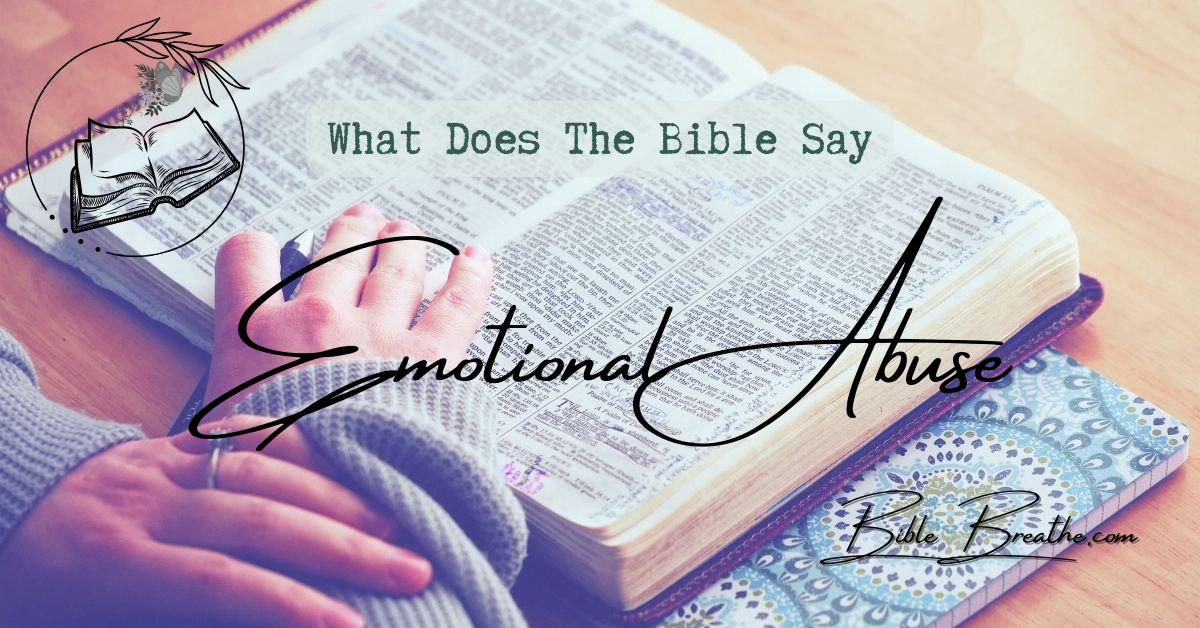What’s the Bible’s take on emotional abuse, fam?
It’s like trying to find clarity in a storm, battling verbal abuse and spiritual manipulation.
We’ve all been there, wrestling with how God’s love fits into the hurt.
You’re not alone in that struggle to understand.
Sometimes, the misconceptions can be as painful as the abuse itself.
But let’s dive into the Word, fam, because it’s more than just a book; it’s a lifeline.
The Bible, it’s a roadmap to deal with the wounds, offering us a biblical perspective on abuse and a path to emotional healing.
We’re talking about confronting that pain and how God’s love meets us there.
But remember, there’s no room for gaslighting and excuses.
It’s all about empathy, compassion, and accountability.
So, are you ready to navigate these stormy waters with the Bible as our guide?
Let’s find strength, healing, and justice together.
🌟
Key Takeaways
- The Bible unequivocally condemns all forms of abuse, including emotional abuse. God’s stance against mistreating and harming others is clear throughout Scripture, emphasizing love, compassion, and the value of every individual as made in His image.
- It is crucial to recognize and address emotional abuse within the context of biblical teachings. The Bible teaches that relationships should be characterized by love, respect, and mutual support. Emotional abuse violates these principles and disrupts the harmony that God desires in human interactions.
- The Bible encourages community support and understanding for victims of emotional abuse. It emphasizes the importance of bearing one another’s burdens, offering comfort, and providing a safe haven for those who have experienced harm. The Christian community is called to stand alongside victims, offering them solace, guidance, and protection.
- Seeking help and healing from emotional abuse is aligned with biblical principles. It encourages individuals to turn to God for strength, guidance, and restoration. Additionally, it underscores the value of seeking professional counseling or support from trusted individuals within the Christian community.
- Understanding what the Bible says about emotional abuse empowers believers to advocate for healthy, loving relationships and to offer support to those who have experienced abuse. It reinforces the biblical message of love, compassion, and the rejection of any form of harm or mistreatment.
Unmasking Emotional Cruelty: A Biblical Perspective

Photo modified by BibleBreathe.com. Original photo by Anete Lusina on Pexels
Hey there, fam!
Let’s dive into a real-deal topic that sometimes hides in the shadows: emotional abuse.
It’s a tough one, but we gotta shine a light on it and see what the Good Book has to say.
Nixing the Misconceptions
Some folks might think the Big Guy up there is okay with abuse, especially in relationships.
But here’s the truth: the Bible is all about love, respect, and treating each other right.
Check out Ephesians 5:25 (KJV) – it’s a game-changer:
Husbands, love your wives, even as Christ also loved the church.
Boom!
That sets the love bar high and kicks abuse out the door.
Past Wrongs and New Beginnings
To grasp what the Bible says about emotional abuse, we gotta time-travel a bit.
Back in the day, some societies had messed-up ideas about husbands and wives.
But the Bible flips the script.
Galatians 3:28 (KJV) shouts it loud:
“There is neither Jew nor Greek, there is neither bond nor free, there is neither male nor female: for ye are all one in Christ Jesus.”
Translation: we’re all equal in God’s eyes, no matter our gender.
That’s a mic-drop moment.
Calling Out the Cover-Ups
Sadly, sometimes religious big shots have brushed off abuse, leaving survivors hanging.
That’s not what the Bible preaches.
Micah 6:8 (KJV) gives us the real deal:
“He hath shewed thee, O man, what is good; and what doth the Lord require of thee, but to do justly, and to love mercy, and to walk humbly with thy God?”
In a nutshell, the Bible shouts “NO” to emotional abuse and says “YES” to love, respect, and justice.
It’s like a guiding light for those who’ve been hurt, offering hope and a way forward to healing.
God’s Perspective on Emotional Abuse: A Beacon of Hope

Photo modified by BibleBreathe.com. Original photo by Karolina Grabowska on Pexels
Emotional abuse, like a relentless storm, can leave the soul battered and bruised.
But in the pages of the Bible, we uncover a lifeline of wisdom and solace for those navigating this painful journey.
God’s Ever-Present Love and Assurance
“The LORD is close to the brokenhearted and saves those who are crushed in spirit.” – Psalm 34:18 (KJV)
When you’re drowning in the sea of emotional abuse, it can feel like no one understands your pain.
But take heart, for God not only sees your suffering but also promises to be right there with you.
His love is a safe harbor for the wounded heart, a place where healing begins.
Debunking Misconceptions
Some may wonder if God’s allowance of suffering implies indifference to our pain or acceptance of abuse.
Let me make it clear—God, in His infinite wisdom, honors our free will but never endorses cruelty.
The Bible tells stories of His people enduring trials, but it also showcases His redemptive power and His unwavering commitment to justice and righteousness.
Taking a Stand for God’s Glory
Learn to do well; seek judgment, relieve the oppressed, judge the fatherless, plead for the widow.” – Isaiah 1:17 (KJV)
Abuse, in any form, defies the very essence of justice and compassion that God cherishes.
As His children, we are called to be lighthouses in the darkness, opposing oppression and extending a helping hand to the wounded.
It’s through our actions, rooted in love and empathy, that God’s glory radiates most brilliantly.
In the Bible, we encounter individuals who triumphed over emotional trauma and abuse under God’s guidance.
Their journeys of healing and restoration testify to the resilience of the human spirit and the transformative might of God’s love.
Seeking Healing for Your Soul
“He healeth the broken in heart, and bindeth up their wounds.” – Psalm 147:3 (KJV)
God doesn’t merely offer solace; He provides a path to emotional healing.
As you navigate the turbulent waters of emotional abuse, you can find strength and renewal through prayer, self-care, and the support of a compassionate community.
In closing, the Bible resounds with God’s condemnation of abuse, His assurance of healing, and His call to champion justice.
When you confront emotional abuse, remember that you are never alone; the Almighty walks beside you, offering love, healing, and the promise of a brighter tomorrow.
Unmasking the Truth About Emotional Abuse

Photo modified by BibleBreathe.com. Original photo by Odonata Wellnesscenter on Pexels
Let’s dive into the deep waters of the Bible to unveil what God truly thinks about the painful issue of emotional abuse.
God’s Abhorrence of Abuse
In the book of Proverbs, specifically Proverbs 6:16-19 (KJV), we find a crystal-clear reflection of God’s stance on abusive conduct:
These six things doth the Lord hate: yea, seven are an abomination unto him: A proud look, a lying tongue, and hands that shed innocent blood, An heart that deviseth wicked imaginations, feet that be swift in running to mischief, A false witness that speaketh lies, and he that soweth discord among brethren.
It’s vital to grasp that God’s displeasure extends to those who inflict emotional harm on others.
These verses unmistakably declare that abuse is utterly detestable in His eyes.
The Struggle of Religious Leaders
Sadly, there have been instances where religious leaders have fallen into hypocrisy concerning abuse and divorce.
However, this contradicts the teachings of the Bible.
In Matthew 19:8 (KJV), Jesus addresses the topic of divorce, emphasizing the importance of safeguarding the vulnerable:
Moses because of the hardness of your hearts suffered you to put away your wives: but from the beginning, it was not so.
This verse underscores that God’s intention has always been to protect the vulnerable, not to use religion to justify abuse.
The Hollow Faith of Abusers
James 1:26 (KJV) serves as a stark reminder of the emptiness of one’s religious practice when devoid of love and compassion:
“If any man among you seem to be religious, and bridleth not his tongue, but deceiveth his own heart, this man’s religion is vain.”
Religious rituals hold little meaning if they don’t lead to empathy, kindness, and respect.
The Consequences of Harming Children
Harming children, whether emotionally or in any way, is a grave matter.
Matthew 18:6 (KJV) highlights the seriousness of harming the innocent:
“But whoso shall offend one of these little ones which believe in me, it were better for him that a millstone were hanged about his neck, and that he were drowned in the depth of the sea.”
This verse underscores that God takes the protection of children seriously and condemns those who harm them.
The Weight of Emotional Abuse
Emotional abuse carries a heavy burden, not just for the victim but also for the perpetrator.
Proverbs 27:3 (KJV) sheds light on this burden:
“A stone is heavy, and the sand weighty; but a fool’s wrath is heavier than them both.”
The weight of harboring abusive tendencies is likened to carrying heavy burdens, illustrating the destructive nature of emotional abuse.
The Power of Hurtful Words
Proverbs 18:21 (KJV) emphasizes the potency of words, especially hurtful ones:
“Death and life are in the power of the tongue: and they that love it shall eat the fruit thereof.”
This verse underscores the lasting impact of verbal abuse on a person’s emotional well-being.
The Rejection of Cruelty
Proverbs 17:15 (KJV) warns against justifying wickedness, including abusive behavior:
“He that justifieth the wicked, and he that condemneth the just, even they both are abomination to the Lord.”
In God’s eyes, there is no excuse for cruelty and abuse.
In conclusion, the Bible leaves no room for ambiguity when it comes to emotional abuse.
God utterly detests such behavior, and His teachings resound with love, compassion, and justice.
It’s a poignant reminder that a faith stripped of kindness and empathy is hollow, and those who perpetrate abuse will ultimately bear the weight of their actions.
The Emotional Agony Faced by Jesus

Photo modified by BibleBreathe.com. Original photo by Anete Lusina on Pexels
The Bible doesn’t just provide guidance on responding to emotional abuse; it presents a powerful example of emotional suffering endured by none other than Jesus Christ Himself.
Accusations and Mockery: Jesus’ Painful Journey
The Gospels paint a vivid picture of the emotional abuse Jesus endured during His crucifixion.
He faced false accusations, relentless mockery, and endured both verbal and physical torment.
Yet, amidst this unrelenting cruelty, He remained resolute in His mission to bring salvation to humanity.
Blame-Shifting and Gaslighting by Religious Leaders
“And they that passed by reviled him, wagging their heads and saying, ‘Thou that destroyest the temple and buildest it in three days, save thyself. If thou be the Son of God, come down from the cross.'” – Matthew 27:39-40 (KJV)
Even religious leaders participated in the emotional abuse, attempting to gaslight Jesus by challenging His identity and divine purpose.
Their goal was to undermine His credibility and mission, mirroring the manipulation and confusion often used by abusers.
Jesus’ Compassion for the Emotionally Abused
In the midst of His own suffering, Jesus displayed profound compassion.
He understood the pain of the emotionally abused, having experienced it Himself.
His empathy and love for humanity led Him to pray for forgiveness for those who persecuted Him, setting a profound example for us all.
Father, forgive them, for they know not what they do.” – Luke 23:34 (KJV)
Jesus’ response to emotional abuse teaches us the transformative power of forgiveness and the significance of showing empathy, even to those who harm us.
It reminds us that we are never alone in our suffering, for He, too, endured emotional pain and comprehends our struggles.
As we contemplate the emotional abuse Jesus endured, it serves as a poignant reminder that even in the darkest moments, there is hope and redemption.
His resilience in the face of cruelty and His unwavering love for humanity inspire us to stand against emotional abuse, extend empathy, seek justice, and provide healing and support to those in need.
Unraveling the Mystery of Emotional Abuse: What Does the Bible Say?

Photo modified by BibleBreathe.com. Original photo by Anete Lusina on Pexels
In this section, we’re about to dive deep into a topic that’s like a dark cloud hiding in the corners of our lives: emotional abuse.
We’ll dig into the Bible, our ultimate guide, to uncover what it reveals about this painful reality and how it can help us find healing and hope.
The Silent Storm: Physical and Psychological Impact
Emotional abuse, my friends, is like a relentless storm that rages inside, leaving scars you can’t see but hurt like crazy.
It’s like a tornado tearing through your heart and soul.
But let me tell you, just as God’s grace has the power to change lives, the abuse has the power to distort them.
Now, think about what Psalm 34:18 (KJV) says:
“The Lord is nigh unto them that are of a broken heart, and saveth such as be of a contrite spirit.”
When you’re in that dark place of emotional torment, God is right there, ready to heal those wounds.
Facing the Giant: Acknowledging the Abuse
You know, King David wasn’t perfect.
He messed up big time, but he faced his sins head-on, and God redeemed him.
That’s the key, folks.
The first step in breaking free from emotional abuse is admitting it’s there.
It’s like saying, “Hey, there’s a giant in the room, and we need to deal with it.”
Proverbs 28:13 (KJV) puts it bluntly:
“He that covereth his sins shall not prosper: but whoso confesseth and forsaketh them shall have mercy.”
We can’t hide from the sins of emotional abuse; we have to confront them to find mercy and healing.
Love in Action: The Church and Community
Now, let’s talk about the role of the church and society.
They’re not just places where we gather; they’re our support systems.
They’re like family, and you know what?
They should be like the early Christian community in Acts 2.
1 John 3:18 (KJV) reminds us:
“My little children, let us not love in word, neither in tongue, but in deed and in truth.”
It’s not enough to talk about love; we have to live it.
We’ve got to step in and help those who are hurting, just like that early church did.
In a nutshell, the Bible doesn’t shy away from the harsh stuff.
It’s a guide for acknowledging the pain, finding hope, and taking action.
God’s love, as shown in the Scriptures, is our guiding light to healing, supporting the wounded, and making our world a place free from emotional torment.
Let’s be the difference, people!
Frequently Asked Questions (FAQs) About What Does The Bible Say About Emotional Abuse
What does the Bible say about emotional abuse in marriage?
While the Bible doesn’t explicitly mention emotional abuse, it promotes love, respect, and kindness in marriage.
Ephesians 5:25 encourages husbands to love their wives as Christ loved the church, setting a standard for healthy, loving relationships.
How can one find support and healing from emotional abuse?
Finding support and healing from emotional abuse involves seeking professional help, confiding in trusted individuals, and turning to the Bible for strength and guidance.
Does the Bible justify staying in an abusive relationship?
The Bible prioritizes love, respect, and the sanctity of life.
While it offers guidance on relationships, it does not condone abuse.
Wisdom, safety, and seeking support are encouraged.
While the Bible promotes forgiveness, it does not endorse enduring ongoing abuse.
Seeking help, setting boundaries, and prioritizing safety are crucial.
Matt Turner
I’m Matt, and I love breaking down Bible verses in a way that’s easy to understand and apply to everyday life. My goal is to help you connect with God’s Word and find practical ways to live it out. Whether you’re new to the Bible or just looking for some fresh insights, I’m here to walk with you and share what I’ve learned along the way.

